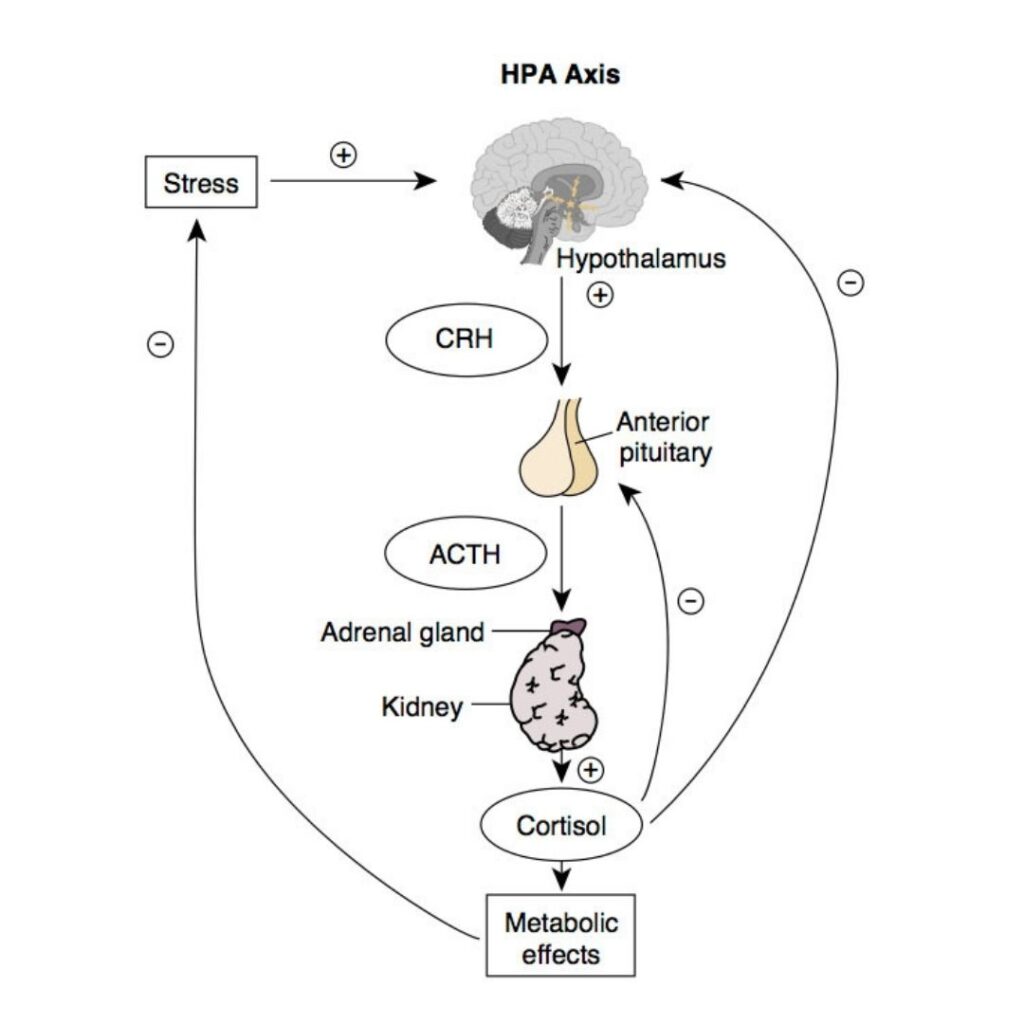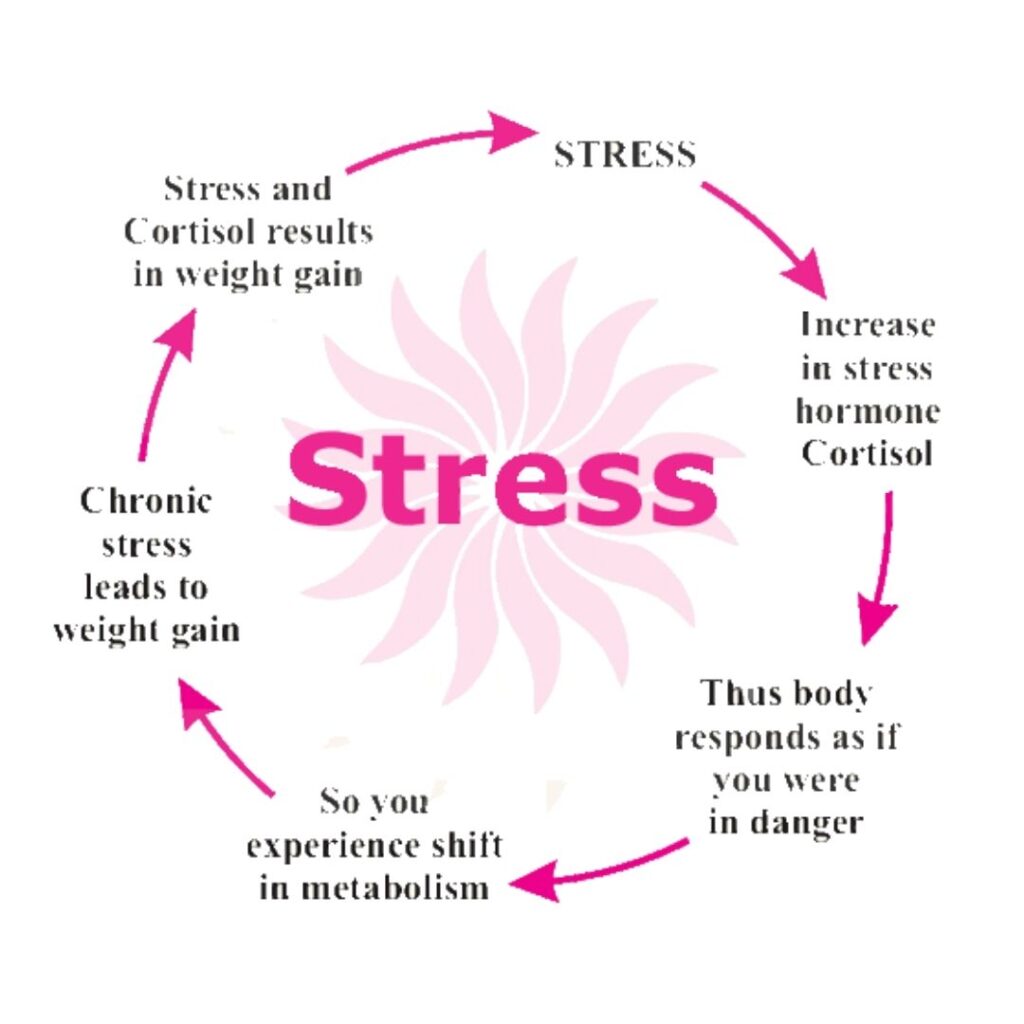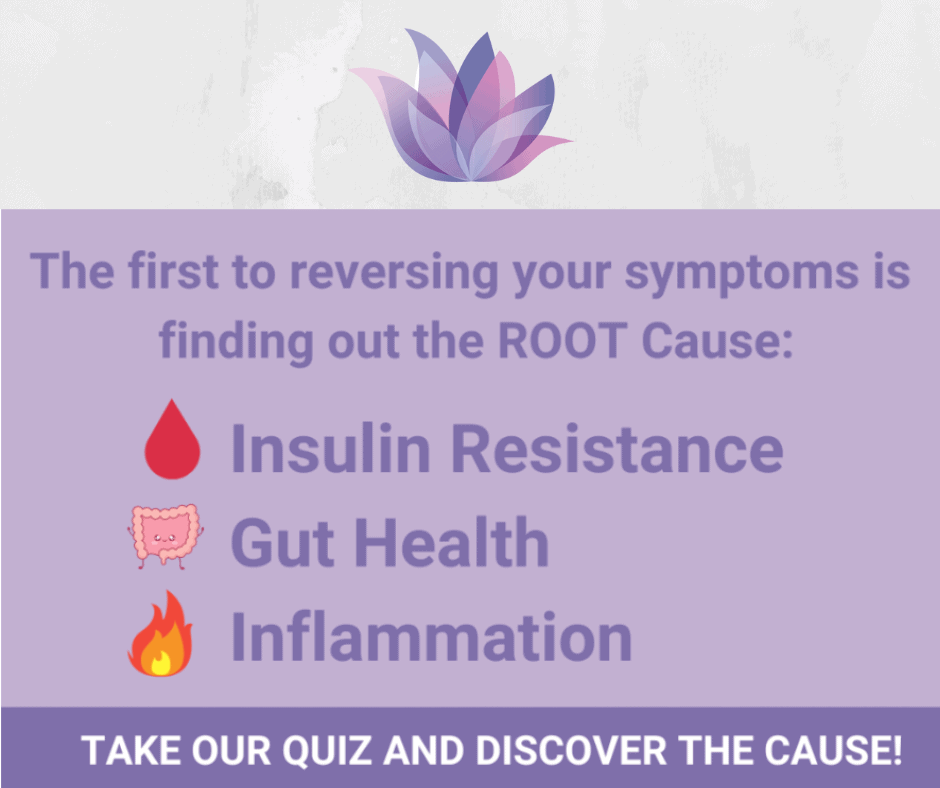Are you feeling stressed out? You're not alone. High cortisol levels can cause numerous health concerns. In this article, I want to focus on how high levels of cortisol due to stress can cause weight gain and what to do about it.
What Is Cortisol?
In our bodies, the stress hormone is called cortisol. Cortisol is part of the HPA axis. The HPA axis includes the hypothalamus, pituitary, and adrenal glands. The hypothalamus secretes CRH, which tells the pituitary gland to male ACTH. This hormone then communicates with the adrenal glands to make cortisol. Cortisol interacts with the neurotransmitter epinephrine to give the effects we recognize as our flight or fight response. We feel a:
-racing heart
-a sudden pulse of energy
-instinct kicking in
-immune system rev up to fight the invader

As a result, glucose is released into your bloodstream to supply quick energy for survival. This is a good thing if you are running from a bear. But constant activation of this system by stress is not good.
The Link Between Stress and Cortisol
During a "threat," cortisol can be helpful to protect our bodies from the threat. But after the danger, cortisol will kick into gear to store more glucose for any future threats. It does this in two ways: create more fat and develop bad habits.
Can Stress Cause Weight Gain Even If Not Overeating?

Yes, this is because it causes the body to make more fat. Even if you are not eating sugary or fatty foods, chronic stress or high cortisol levels slow your metabolism down. A slow metabolism makes it more difficult to lose weight even if eating the right foods.
Data from a 2015 study indicated that women who had two or more stressors the previous 24 hours burned 104 fewer calories than non-stressed women. Over the course of a year, this could be 11 pounds of weight lost. They also had higher insulin levels, which can lead to insulin resistance and ultimately diabetes long-term.
High Cortisol Causes Low Estrogen
High cortisol levels also suppress gonadotropins made from the pituitary (FSH and LH) and estrogen and testosterone produced at the ovary level. Therefore, making it an endocrine disruptor like environmental toxins.
High Cortisol Lowers Thyroid Function
High levels of cortisol interfere with thyroid binding globulins, decreasing the activity of your thyroid. This is a double-whammy for those who have hypothyroidism.
Struggling with low energy, weight gain, mood swings, or fertility troubles? Test your hormone levels and get on the path to better balance today.
Cortisol (stress) Induced Bad Habits
In addition to slowing your metabolism, stress also causes you to develop bad habits. The brain is rewired to get rewards if you do this bad habit. The body wants extra glucose in case it is under a new threat.
Why do I crave fatty foods and sugar when stressed?
Chronic stress (high cortisol levels) suppress the satiety hormone (ghrelin), and you feel hungry even if you are not. Sugary or fatty foods are a quick source of glucose or sugar so your body "craves" this type of food. It is a vicious cycle of stress--cravings--eat more--weight gain--inflammation--high cortisol, etc.
Unfortunately, the fat stored is in the abdominal area, "spare tire."
Why do I go through the drive-thru on the way home?
Chronic stress also rewires your brain, and even the smell of that food will trigger you to feel like you need to eat that food. The definition of stress is strain or pressure on a system. Constant stress causes high levels of cortisol which makes your brain want to get glucose the fastest and easiest route possible. Which can be going through the drive-thru.
It also causes you to overeat when stressed because the brain is thinking about the next threat and survival. Overeating can occur when sitting down for a meal or tending to snack because the food is in front of you.
What Does Chronic Stress Feel Like?
These are the common symptoms of chronic stress.
-Fatigue
-Brain Fog
Weight Gain
-Poor Sleep
-Digestive Issues
How do you diagnose stress-related weight gain?
Scheduling an appointment is straightforward if you are struggling to lose weight.
How Can I Stop Gaining Weight From Stress?
4 steps. Start Slow. Small Changes Make A Huge Difference.
Reduce Cortisol Through Diet.
An anti-inflammatory diet with adequate fiber intake, at least 35 grams/day. The anti-inflammatory diet is predominantly a plant-based Mediterranean diet. Veggies are rich in antioxidants and phytochemicals that decrease inflammation and help hormone production and function.
Adequate Fiber intake is critical to removing excess hormones like estrogen. Fiber will help you have regular bowel movements and eliminate excess estrogen and other toxins. It will also stabilize blood sugars and combat cravings.
Practice Timed Eating.
The gut microbiome needs to be healthy. The gut needs time to rest and digest. The best is a 12-hour window. So try to have a fasting window of 12 hours a day. If you stop eating at 8 pm, do not eat anything until 8 am. Resting allows the bacteria in the gut (microbiome) to properly digest your food and get the proper nutrients from that food.
Besides timed eating, consuming pre-biotic-rich foods help fuel the bacteria. Adding probiotics will add more of the healthy bacteria back into your gut.
Use Stress Reduction Techniques Daily
If you are tired and wired, it is time to work on stress reduction. There are several ways to practice stress reduction, but here are a few ideas.
- Get 7 to 9 hours of sleep a night.
- Start a gratitude journal.
- Practice Breathwork.
- Move Your Body Daily.
- Make sure to prioritize fun.
Add Supplements like adaptogens.
Food is always the preferred route to get the proper nutrients for your hormones. But if you need to supplement, then consider these below.
ASHWAGANDHA
Ashwagandha—an ancient, adaptogenic herb—to lower cortisol and stress. Preliminary research supports ashwagandha's potential as a natural therapeutic agent for stress and anxiety. One study found that Ashwagandha supplementation reduced psychological and physiological markers of stress, improved mental well-being, and reduced serum cortisol level and food cravings in men and women under chronic stress.
Hence, the name Adaptogen.
Omega-3/Fish Oil
Fish oil has been linked in studies to a diverse and healthy gut microbiome. It also has anti-inflammatory benefits that can help heal the gut. The omega-3 fatty acids found in fish oil are essential for the body, so if they're not consumed in the diet, supplements may be recommended.
Why Should I see a Holistic, Integrative Gynecologist?
Treating and managing stress-related weight gain starts with visiting our office to discuss your concerns. After lab work to rule out other health conditions, we will create a personalized plan to decrease stress slowly. This plan could include recommendations for nutrition, exercise, sleep, mind-body, supplements, and herbs.
In addition to implementing the stress-busting steps listed above, we partner with a holistic nutritionist to help you develop a balanced nutrition plan that fits your needs.




